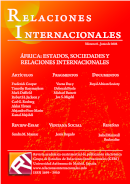Keywords:
collapsed state, conflict, security, Africa, society, RDCCopyright (c) 2008 Timothy RAEYMAEKERS

This work is licensed under a Creative Commons Attribution-NonCommercial-NoDerivatives 4.0 International License.
Abstract
In the aftermath of 9/11, the problem of state ‘collapse’ appears again on he agenda as an important question of global security. Nevertheless, the academic discussion has not come much further than post conflict dynamics of interference of various new ‘orders’ that move beyond traditional state capacities. The discussion on state collapse thus seems to be placed in a growing deadlock between classical state-centrist approaches —which keep pointing at functional problems— and more society-oriented insights that try to explain other political and economic loyalties that have emerged in the context of weak state performance. Both approaches nonetheless appear increasingly incapable of defining and delimiting the notion of political order absent of an overarching state framework. While often contradictory xplanations exist about what may lead states to collapse, little grounding is provided as to what actually lays beyond this witnessed breakdown of public authority. Besides the global war on terror, such grounding appears more necessary than ever if we look at the continuing problematic nature of statehood in many parts of sub-Sahara Africa, a continent hitherto beset with endemic warfare. Instead of a transition to peace and democracy, many conflict-ridden regions in Africa seem to evolve rather towards a situation of “neither-war-nor-peace”, but in which the evolution of political (dis)order increasingly escapes our analytical and intervention capacities.
This paper makes a first attempt to fill these blank spaces on the analytical map. It does so by explaining, first, the obstacles that appear to be blocking an integrative approach towards the problem of state implosion. Second, it offers a first step into developing an alternative framework for studying political order in ituations of post state collapse’. The argument provided in this paper is not new: it builds extensively on earlier theoretical and empirical insights into the limits of particularly Third World) state capacities. What is new though, is that it tries to integrate these views into the analysis of post-collapse situations. Central to this approach is the notion of political power (or social control): taking as an entry point the “areas of domination and opposition” that exist in the midst of state-society relations, it specifically looks at the different forces in society that try to monopolize the three domains that are traditionally connected to modern state performance: the monopoly over violence, the allocation of economic resources and the representation of a more or less ‘fixed’ population. Although obviously more sympathetic to more society-oriented approaches, the presented view nonetheless tries to combine these with a more integrative model of state-society relations, which serves to analyze how states and societies continue to constitute and transform one another in a context of withering of state capacities.





